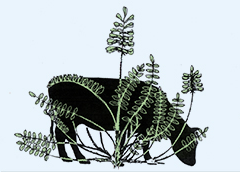Abstract
Livestock toxicity resulting from poisonous plants poses a significant challenge for ranchers, particularly concerning locoweeds (Astragalus spp. or Oxytropis spp.). This study investigated a case of cattle poisoning in central New Mexico, where clinical signs were consistent with locoweed toxicity. Rangeland conditions were hot and dry following earlier spring rains, promoting advantageous environmental conditions for a locoweed outbreak. Analysis of Woolly locoweed (Astragalus mollissimus) and animal samples from the ranch confirmed the presence of swainsonine, a key toxin in locoweeds. It can be concluded that the likely cause of cattle losses was locoweed toxicity, highlighting the need for proactive management strategies when environmental conditions are conducive to increases in locoweed populations.
Recommended Citation
Spackman, Casey N.; Stonecipher, Clint A.; and Cook, Daniel
(2024)
"Cattle Toxicity from Woolly Locoweed (Astragalus mollissimus): A Case Study in Central New Mexico,"
Poisonous Plant Research (PPR): Vol. 7, p. 3-7.
DOI: https://doi.org/10.26077/0112-c12c
Available at:
https://digitalcommons.usu.edu/poisonousplantresearch/vol7/iss1/1

